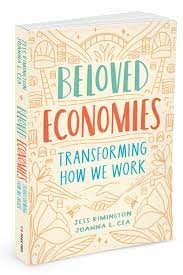 Have you ever read a book that continues to rearrange things in your mind long after you turn the last page? The book Beloved Economies by Jess Rimington and Joanna Levitt Cea is that book. It has challenged everything I know about work, about employee engagement, and even about the role of leadership. The core premise of the book is that the current economy, “in its lovelessness,” focuses on financial profits while compelling us to work in ways that make it harder for most of us to have the time, energy, or resources to be together in the ways that make life good. What’s more, it’s all by design—so why not set out to re-design it? That’s right, re-design…The goal of this book is to help transform the way we work. They make the distinction between innovating on what’s known and truly transforming or reimagining work. And that’s why, weeks after I read it, I can’t stop imagining what’s possible! Wait! How did we get here? The authors set historical context for several things we “take for granted” in many work settings in the U.S. They argue that, deeply embedded in the world of work, we find practices that reinforce the belief that everything operates best when controlled by a few. Moreover, seemingly innocuous practices such as spreadsheets to track inventory and calculations such as depreciation schedules can be traced back to the days of slavery and plantations in the U.S. south. Reimagining Work: Where do we start? In the book, the authors introduce concrete ways that people have successfully broken out of the mold from “business as usual” to a “Beloved Economy” workplace. They offer these ideas as inspiration and ask this question: If you work in a company where you trust your employees and treat them with respect, how would you design the systems differently? Although I know many of us feel that we are not in a position to reimagine our workplace, I challenge you to think of small changes that might have a large impact. Here are a few ideas that come to mind to get your brain going… Reimagine accountability. Our current practices of spreadsheets and status reporting can be over-emphasized in organizations where trust is low. What accountability measures do you put in place when you hire and work with highly competent, motivated people? Maybe in those environments, it’s not a focus on what you’re working on, it’s more about what should come off their plates or be reprioritized. The manager is coming from a place of support in helping others get the right work done, rather than a place of blame when things are not getting done. Reimagine career pathing. If you take a look at the “jobs” or “careers” tab on the websites of many large organizations, you’ll find reference to pre-defined career paths and tracks. But is it the responsibility of managers or an organization to lay out a career path for an employee? The underlying assumption is that the employee is not capable of determining their own path. Each person is unique in what they bring to the table and an organization may not even have a career path that would leverage a person’s potential. What if instead of the manager carving out the path, the manager learns to be an exceptional career coach? They can ask questions that will bring out the best in the employee so their strengths are being leveraged and identify the needs of the organization at the same time. Reimagine authority. In many organizations, the senior leaders make the critical decisions, especially when a project needs to pivot or change drastically. This then often causes a ripple effect down to the people who are working on the project day-to-day. Rarely do senior leaders engage with the “workers” to ask their opinion on changing the rate or scope of work. What would it look like if the people engaged in the day-to-day were asked their opinions on how to handle major changes to the scope of a project? Imagine if you were considerate of the impact the change has on everyone involved and create a forum where people could voice their opinions before announcing a big change in the project? Reimagine relationships. We often hear in organizations how important it is to build a network and maintain relationships, but it’s often for the purpose of gaining something in the end. In other words, there is a means to an end. In Beloved Economies, people build relationships because they genuinely care and are curious about another person. What would happen if you took someone out to lunch or had a quick virtual coffee with someone in your organization whom you don’t work with, and have nothing to gain from? Perhaps you take out a new employee for coffee, even if they will never intersect with your work. Or, perhaps connect with an employee outside of work who may live close by but your roles would rarely have a reason to connect. What else could you gain from building new relationships? Maybe it’s simply a good laugh, or a mental break, a moment of pause, or a joyful celebration. Think of ways to connect for the sake of being human, not necessarily for productivity. Check out the portal for notes on this eye-opening book, and let me know what ideas this discussion sparks for you.
0 Comments
Your comment will be posted after it is approved.
Leave a Reply. |
AuthorLaura Mendelow |
|
|
©2020. All Rights Reserved. Mendelow Consulting Group, LLC.


